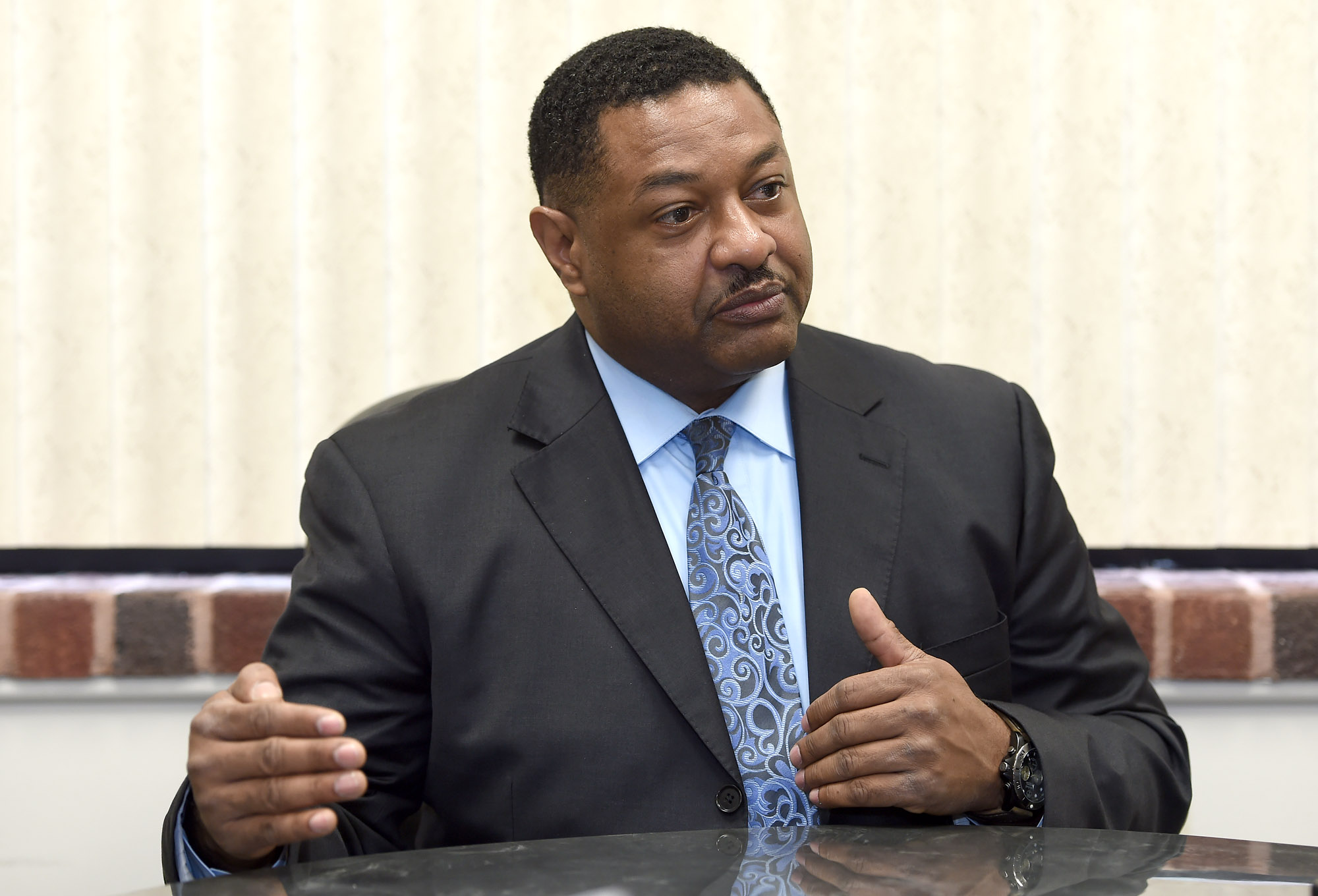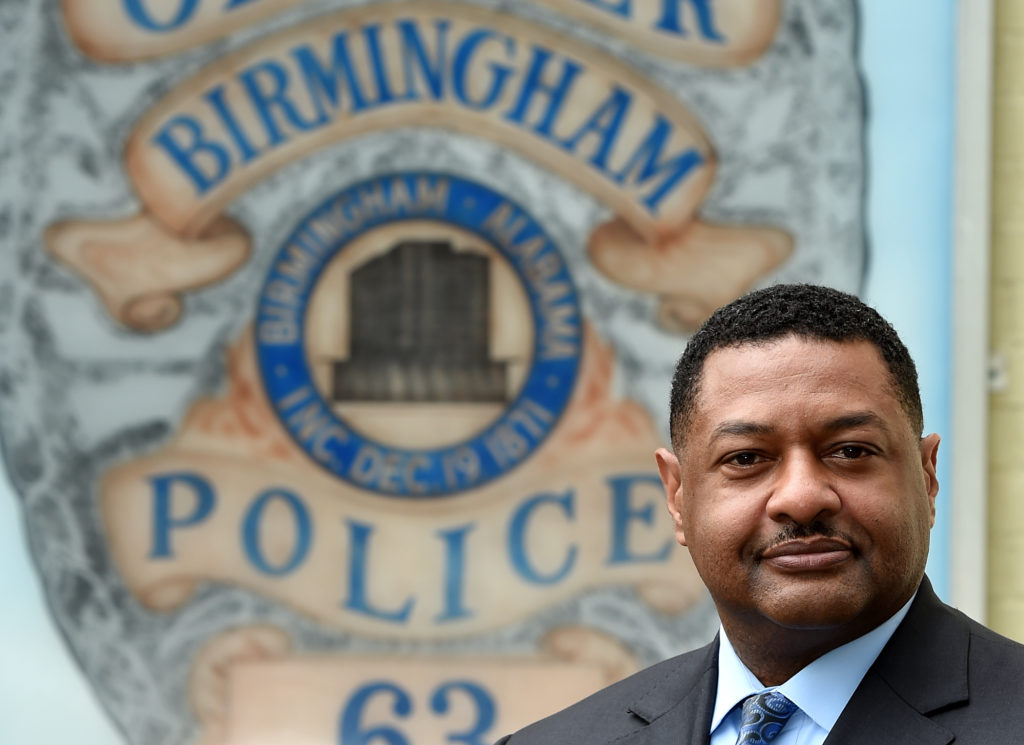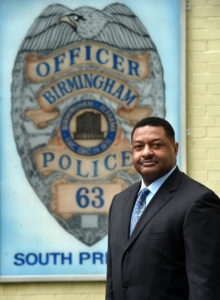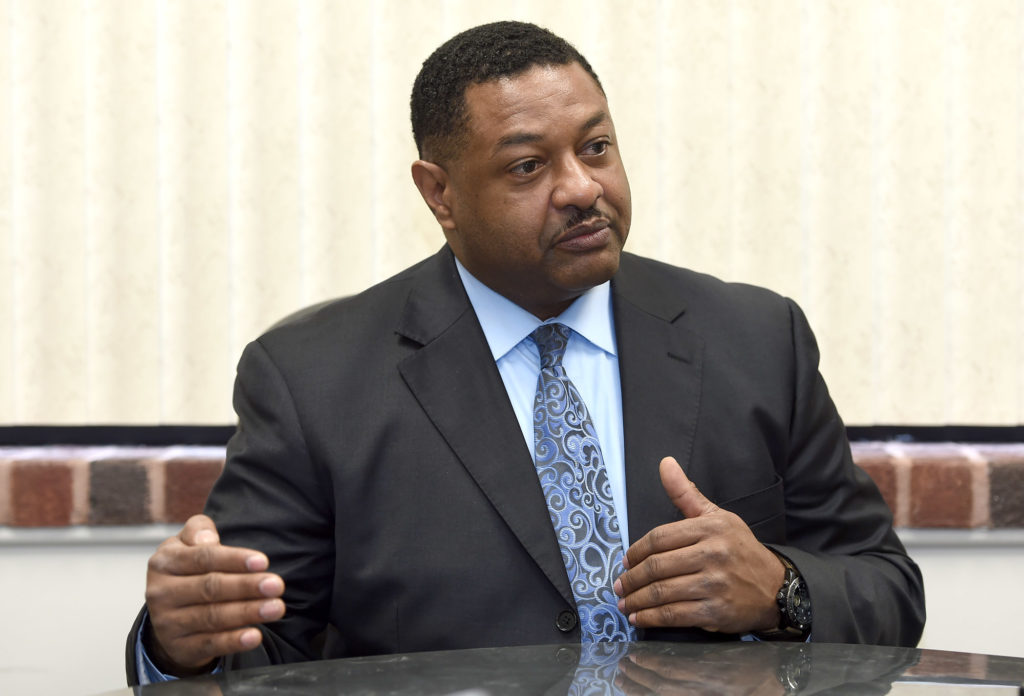
By Barnett Wright
The Birmingham Times

Patrick Smith took office on Monday, June 25, as Birmingham’s new police chief, and among his belongings is an envelope he’s carried since the start of his law-enforcement career 28 years ago.
When Smith joined the Los Angeles Police Department (LAPD) in 1990, his mother gave him a sheet of paper and asked him to write his goal for the future. He wrote four words: “Chief of Police, Birmingham.”
“I kept that piece of paper in an envelope for the duration of my career,” Smith said in a recent interview with the Birmingham Times. “When I received the call from [Mayor Randall Woodfin about] becoming chief of police in Birmingham, it was a very emotional moment because I pointed to the heavens and said, ‘I told you, Mom, we could do it.’”
Smith’s mother, Dorothy, passed away seven years ago, but she would be proud of her son—a veteran LAPD administrator who is now police chief for Alabama’s largest city. After a five-month search, Woodfin announced on June 4 that Smith would serve as chief of the Birmingham Police Department (BPD).
Smith, 54, a Tuscaloosa native, is taking over during a time when homicides and some violent crimes have increased in Birmingham, and residents and city leaders want something done.
“I love the city, but I would like for there to be better police protection when stuff goes on,” said Prude Fuller, president of the Airport Highlands Neighborhood Association. “I think that’s very important because there’s too much crime … in the city in general.”
Smith has heard from citizens and read up on Birmingham, and he is aware that crime stats will be closely watched during his tenure. He doesn’t want anyone to expect an overnight fix, though.
Top Priority
“The biggest thing I see for the BPD is hiring, recruitment and retention,” Smith said. We can’t do anything until we … get the right people on the job. Currently, we have more than 100 vacancies. That affects the number of people who are out on patrol, who are addressing calls. We need to address the basic services, [such as 911 calls], before we do everything else. That’s going to be one of my primary focuses because [we need to have the right] people to address crime.”
Smith knows he must also get out among the citizens in Birmingham’s 99 neighborhoods and 23 communities.
Birmingham City Council President Valerie Abbott said, “I would advise [Smith] to meet with the [23] communities and hear what they have to say. “[All] 99 neighborhoods would be too many to meet with, but the people who actually live in the neighborhoods know what the problems are.”
That’s part of his mission, Smith said: “I plan to learn the 23 communities and 99 neighborhoods within the city because each one has to have a different formula for what will work. Law enforcement is not one-size-fits-all. I’m not coming into Birmingham thinking I know everything about the city and everything that’s going on.”
Alabama Native

Smith was born and raised in Tuscaloosa and attended Central High School. He also is the youngest of 13 siblings, which in some ways helped prepare him for his future career.
“Growing up the youngest of 13 was a very interesting experience,” he said. “You learn different roles. You learn to be a negotiator. You learn to be a collaborator. You learn to work with your family as a team. You learn how to resolve problems. I think all of those are important and effective tools in law enforcement.”
He remembers watching some cop shows when he was younger, including “The Mod Squad” with the supercool Clarence Williams III as Lincoln “Linc” Hayes, described by Smith as a “very dynamic character.”
“Just the fact that they were working kind of a quasi-undercover assignment, I found that interesting,” Smith said of the TV crime drama that aired from 1968 to 1973.
Family Ties
Smith’s upbringing—with his mother, Dorothy, a Head Start teacher, and his father, Jasper, a longtime worker at Tuscaloosa’s Central Foundry—has always been his strongest influence.
“[My parents] were both down-to-earth, genuine people,” Smith said. “They kept a close-knit family. In fact, my family still has dinner together every Sunday after church. When my mother passed away, we were able to track her membership at our family church back 53 years. Just coming back here and being able to return to [First African Baptist Church in Tuscaloosa], which my mother … and entire family attended for many, many years, is a blessing within itself.”
Smith’s law-enforcement career came into focus when he joined the military. He served seven years in the U.S. Marine Corps, completing his basic training at Parris Island, S.C. And he made stops at Camp Pendleton in California, as well as in Okinawa, Japan; Fuji, Japan; and the Philippines.
“One of the things I did while traveling extensively was learn different cultures, different people, and different environments … just learn about people,” Smith said. “I think it has been extremely important because [it taught me] to respect different cultures and different people, how they were brought up, and the things that are important to them.”
How does that apply to the duties of a police officer?
“I can take someone to jail, but I don’t have to disrespect them as a person,” he said. “I can bring them in for what they’ve done, and they can be held accountable through the criminal justice system. But as an individual officer, as an individual person, it’s always important to treat [people] with dignity and respect regardless of what they’ve done.”
LAPD

In Los Angeles, Smith worked his way up through the ranks, starting as a patrol officer, then becoming a police field-training officer and instructor, sergeant, lieutenant, and captain. Most recently, since 2015, he served as a police commander.
Transitioning from a large city like LA to a smaller one like Birmingham can be a culture shock. LA has a population of nearly four million, and the LAPD has approximately 9,000 sworn officers and 3,000 civilian employees. And Birmingham has a population of just more than 212,000, and the BPD has approximately 912 sworn officers and 325 professional staff. But, just because Birmingham and its force are smaller doesn’t mean Smith’s job will be easier.
“Challenges have always driven me,” he said. “If there were no challenges in society, we probably wouldn’t exist. There will always be challenges, and we should look forward to and prepare for the next challenge, prepare for the next stage of what we are trying to achieve.”
Smith said he will set expectations for his department from day one.
“The message has to be very strong, and it has to come from me,” he said. “The most important thing is to select the right people and put the right people in place. First Assistant Police Chief Allen Treadaway is delivering that message right now. [He and I] have to meet with our deputy chiefs and constantly with the captains … to make sure we’re delivering a very strong message about professionalism. When we see things happening that are inappropriate or not being done in the manner that we would like to see, we address it right away.”
Smith is soft-spoken but should not be taken lightly.
“You don’t have to carry the biggest stick in town to be effective. You just have to use it smartly,” he said. “You deal with people wisely. You find out what motivates them. You find out how to get things done. The most important thing is to motivate people to address crime, as well as to set expectations and set goals. For me, if you can’t do it, trust and believe, I will find someone who can … because the mission will be accomplished. The mission comes first, and we will deal with everything else afterward.”
‘Keep Pushing’
As the interview winds down, Smith returns to talking about family and recalls an incident that happened when he was about 8 years old and was returning from an outing with his father.
“We were in the car talking, my dad and I, and we were pulled over [by police],” Smith said. “The officer asked my dad several questions: ‘Where are you going?’ Where are you coming from?’ ‘Who are you?’ [He] just asked a long line of questions and, in the end, my dad had done nothing.
“There was no citation, nothing was issued. They just happened to be looking for someone. We don’t even know who it was. There was no explanation, and the officer didn’t do anything wrong. He could have been conducting an investigation, [but] we have no idea. … My dad, a very humble man, tried to explain, ‘It’s going to be OK.’ … [But] I could tell by the troubled expression on my dad’s face that [he had seen a lot of things happen]. I said, ‘You know, Dad, when I grow up I’ll be chief of police, and I’ll make sure that doesn’t happen.’ [My father] just smiled and … said, ‘Son, when you grow up you can be anything you want to be.’”
That’s a lesson Smith shares with many young people and with his five children, the youngest of whom is a high school senior.
“Our young people need to have goals, they need to have dreams, but most importantly they need to know it’s possible for them to achieve their goals and be anything they want to be,” Smith said. “My dad always told not only me but also my nieces and nephews, ‘You can be anything you want to be. Never allow anyone else or obstacles to hold you back. Keep pushing and keep going, and you can get there.’”




